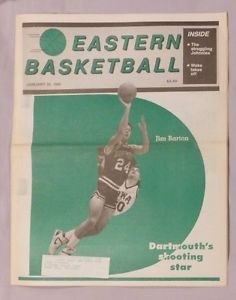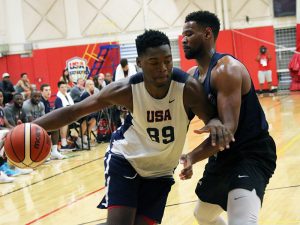Times might be tough for a lot of people in America…but not if you are a D-1 men’s basketball coach. A 2014 study by the American Association of University Professors found that the median compensation for men’s head basketball coaches at D-1 schools increased by a whopping 102% during a 6-year stretch from 2005-2011. This is based on a variety of factors (including NCAA Tournament broadcasting rights) and has had a number of corresponding effects (such as some assistant coach salaries that are starting to approach $1 million). HoopsHD’s Jon Teitel recently got to speak with Robert Lattinville and Roger Denny (attorneys from Spencer Fane LLP who have conducted some fascinating research into this topic) to get their thoughts on what caused this trend and whether it is sustainable.
According to a USA Today article last spring, Louisville’s Rick Pitino was the highest paid head coach last season with $7,769,200…but then he got suspended for 5 games earlier this summer for allegedly failing to monitor his program during an alleged sex-for-pay scandal: should any college coach be making that much money, and what impact do you think his salary had on his punishment (if any)? As sports lawyers we do not believe that we are qualified to say whether a basketball coach of any level of skill/accomplishment should be paid exponentially more than a brain surgeon, cancer researcher, or 2nd-grade teacher. To be sure, among the ranks of college coaches their skills/accomplishments range from those of glorified gym teachers to CEOs of multi-million dollar enterprises with broad and unique skills applied in continuous high-pressure high-profile activities. For all of the other things it is or purports to be, we view college athletics as a premier sector of the entertainment industry. Properly considered with respect to the current market for that industry sector, the highest-salaried college coaches are paid within the realistic bounds of that market. We do not view the issue as a matter of scale (i.e., coaches pay vs. pay for other professions): we view it as 1 of relative scale in a top-down auction market. In that market, the case can be made that Coach Pitino is fairly compensated relative to his peers (for which there are few that are similarly qualified). To that end, note that the total amount includes a $750,000 bonus in the current year: in the absence of that bonus, Kentucky coach John Calipari would have been the highest paid men’s basketball coach this season.
Each of the top-5 salaried coaches on the list (Pitino/Calipari/Mike Krzyzewski/Bill Self/Tom Izzo) make more than $4 million/year and have won a national title: if a coach has a history of getting his team into postseason play and winning titles, are those good enough reasons to pay him a lot of money? Participation in the postseason certainly drives an economic benefit to the university (http://www.forbes.com/sites/chrissmith/2014/03/20/how-a-single-ncaa-tournament-win-is-worth-1-6-million/#63a53d8332b0) and consistent participation and success magnifies that benefit, perhaps exponentially. If there are other activities in which the coach engages that discount/detract from the value of such performance, the university should estimate and contract for the appropriate discount, which includes the termination of such employment for cause.
The total pay for these coaches includes many elements beyond their base salary (such as retention payments, deferred compensation, money from shoe/clothing/apparel companies, advancing in the NCAA tourney, multi-media deals, running summer camps, speaking fees, etc.) as well as all kinds of perks (private jets, housing allowances, severance packages, etc.): do you think these are all reasonable extras or do you think that a coach who makes a 7-figure salary should be expected to make it to the Sweet 16 and/or pay for his own house? Many of those perks and added benefits were borne from thoughtful tax planning on behalf of universities and coaches’ counsel. Unfortunately, these perks have now become expected by many, leaving the industry to continue to find new ways to create value (life insurance being the most popular of the current trends). As a threshold matter, the competitive nature of the business (win or be fired) should compel a consistent, maximum effort from coaches. The bonuses/extras should be better structured to reward performance that exceeds current the coach’s current annual guaranteed compensation.
According to some of your own research, Louisville’s Kenny Payne was the highest-paid assistant coach in the nation last season with $805,000 but the Cardinals’ entire staff compensation as a percentage of program revenue was the cheapest in the nation at 2.71% (Rutgers was the highest at 13.01%): if a school has a huge athletic department budget, then should they just be allowed to spend all that money on salaries or whatever else they desire? Should they be “allowed to”? Yes, certainly (unless and until the market is disrupted in a meaningful way). However, I think the universities that already are/are becoming the standard-bearers in D-1 are more intently focused on measuring ROI (return on investment) and finding the most efficient uses of their revenue. In most years, the single-most important determinate of economic success in a collegiate athletic department is competitive success, which is driven by recruiting/developing high performing student-athletes. Unlike the sport of football where a player must wait until 3 years after his high school class graduates to enter the NFL Draft, basketball players become NBA draft-eligible at age 19 (assuming a few other qualifying factors). Since “1-and-done” players are typically the most talented ones in college basketball, the emphasis on recruiting this kind of player is logical. In most instances, a university’s most productive means of recruiting talented players is by hiring/retaining coaches who are effective recruiters.
Kentucky had the highest average assistant coach salary in the nation last year at $562,333 (which is more than the $521,000 former UNC-Wilmington head coach Kevin Keatts made last season after winning his 3rd straight CAA title): do you think that there are guys who would prefer to be an assistant rather than the head man as long as they are making the same amount of money? All things being equal, few coaches would rather be an assistant. High-level college basketball hiring is a bit unique in that high-major head coaching jobs rarely go to assistant coaches. The likely effect of rising assistant coach pay is that high-paid assistants become more choosy about the head coaching jobs that they will consider, recognizing that accepting such a position may also be accompanied by a pay cut. This may limit the market for qualified head coach candidates.
NC State had the most experienced staff in the nation last season with 82 years of aggregate experience yet missed the NCAA tourney, while Florida had 1 of the least experienced staffs with only 25 years aggregate experience yet made it all the way to the Elite 8: what kind of correlation is there between an experienced staff and on-court success (if any)? As coaches like to say, “It is not about the Xs and Os: it is about the Johnnys and the Joes!” It is very difficult to normalize the on-court performance of coaching staffs because disparity in talent is such a critical factor. Moreover, the varying role of the head coach is also a factor that challenges an appropriate regression analysis. I think that experience has somewhat of a decreasing utility: previously, additional experience meant extra time on the recruiting trail, more connections to high-school and club team coaches, greater evaluation of competition, etc. As with most everything else, technology and increased exposure for recruits has leveled the playing field such that lesser-experienced coaches are able to quickly gather, process, and use the available information and contacts.
Oregon State was the most expensive program last year at $141,543.20/win while Purdue was the least expensive at $20,799.26/win: do you think that Boilermakers coach Matt Painter deserves a nice raise after making the NCAA tourney in 9 of the past 11 seasons without charging his school a fortune? As relates to Coach Painter, I think there are 3 distinct circumstances worth mentioning: (1) Coach Painter signed an 8-year deal in 2011 (which was amended in 2016 to add 3 more seasons), a deal that was then, and would be now, for a longer term than what is customary; (2) he was on the proverbial “hot seat” as recently as 2015; and (3) there has been substantial turnover in the period since he signed that deal. The longer term buoyed Coach Painter during the time when Purdue was “down” (they did not win a single NCAA tourney game during a 4-year stretch from 2013-2016), and it remains above the Big 10 median…but I would expect an amendment to be forthcoming.
1 of the emerging trends you discovered was that many assistant coach contracts now include provisions that tie the length of their employment to the tenure of their head coach: why is this a new thing, and do you think it is a good or bad idea? I think it is a smart strategy: the circumstances are extraordinarily rare for a new coach to retain his new school’s existing staff. Tying the assistant coaches’ contracts to the head coach’s contract can accomplish, at least, the following: (1) more thoughtful hiring decisions by the head coach, and (2) cost savings if the head coach departs on his own volition or as a result of a university termination with or without cause.
Some of the biggest factors that increase a school’s bottom line are alumni boosters/season ticket sales/licensing revenue: if programs like Duke/Kentucky bring in more than $20 million/year in revenue and/or have rich alumni who support their program, is that a good reason to pay their coaches a lot of money? The evidence suggests that coaching is a primary driver of success and success is a primary driver of revenue. As mentioned above, unless and until there is disruption in the amateurism model, attracting and retaining elite coaches will be a smart use of available resources. Perhaps the most clear demonstration of this is at Michigan, where the athletic department experienced somewhat of an economic renaissance from the hiring of head football coach Jim Harbaugh after the 2014 season (www.mlive.com/wolverines/index.ssf/2015/09/tickets_sales_up_revenue_on_th.html).
I think it is safe to assume that star coaches often attract the best players (thanks to lavish stadiums/other amenities/a proven track record of helping players make it into professional leagues): what do you think that recruits care about the most, and does a coach deserve a bonus for being a great recruiter even if it does not translate to on-court success? The answers are different in football and basketball. In football, the athlete is going to be on campus for a minimum of 3 years, so providing the best available experience (in terms of resources and the quality of the facilities in which they spend the vast majority of their time) for that 3-year period is a key recruiting advantage. In basketball, the 1-and-done rule has forced recruits to evaluate their college choice based upon their belief of which coach/program can best amplify their exposure to the decision-makers at the next level. Often, the exposure follows the coaches in college basketball. However, we do not believe that recruiting should be separated form performance for bonus purposes. Universities previously rewarded coaches with bonuses if they had a high recruiting class ranking. However, there has been a trend away from that practice as universities recognize that such rankings can be somewhat arbitrary and individual talent is no guarantee of team success (note that the #1 pick in each of the last 2 NBA drafts came from a team that did not qualify for the NCAA tournament: Ben Simmons of LSU and Markelle Fultz of Washington).
The popularity of March Madness seems to always be on the rise (Americans spend a collective 650 million+ hours/year watching the NCAA tourney on various screens, and there are estimates that companies lose almost $2 billion in wages while people fill out brackets and track the results): is it too simplistic to say that coaches deserve to get paid more when CBS/Turner are paying the NCAA more than $1 billion/year for the broadcast rights? Coaches seem to be the most-marketable commodity in college basketball, so I understand the argument for allowing them a greater share of the revenue. However, I think that prudent athletic directors are intently focused on the shifting grounds for media rights and will fight the urge to make spending decisions based upon those TV deals.
Is there any correlation between having a winning program and enrolling better students or securing more funding for academics, and if not then is it worth paying a high salary to a coach even if he is a consistent winner? There is empirical evidence to support the “front-porch” theory of collegiate athletics: applications and interest in institutions certainly increase when an institution succeeds athletically, especially in the revenue sports (www.cnbc.com/2016/04/08/march-madness-win-brings-college-admissions-windfall.html).
Some schools charge their students an “athletic fee” that are as much as $1000/student: do you like this policy, and what are the right/wrong uses for such a big pot of money? It depends on what the fee covers. If it entitles the student to admission at games or other tangible benefits, then it may make sense. If it is merely a tax for a specific project (as is often the case), then we believe there to be more palatable funding opportunities available to well-run athletic departments.
Have we reached a point of no return when it comes to escalating salaries, and if not then what can schools do to stop it without the risk of being charged with collusion or a violation of federal antitrust law? Perhaps we have reached a point of return as to the nominal amount of compensation payable, but we see a shifting trend in which athletic directors are retrenching and becoming more thoughtful about structure (especially as relates to deferred compensation/bonuses). As the approach to incentives becomes more thoughtful, we will see a better alignment of coaching contracts and less turnover (noting that shortened tenure is perhaps the single biggest factor in rising salaries: www.spencerfane.com/wp-content/uploads/2017/06/Sample-Analysis-2016.pdf).
According to a Washington Post review of financial records, rising administrative/support staff salaries are some of the biggest reasons that otherwise profitable or self-sufficient athletic departments have deficits (in a 10-year span the non-coaching payrolls at the combined athletic departments of 48 schools in the 5 wealthiest college conferences rose 69% from $454 million to $767 million): what caused such a spike, and why on earth would a school pay all these other salaries if it causes them to lose money? In prior years schools paid these amounts because there was little fiscal accountability: revenue (especially among the Power 5 conferences) was assumed to grow at a rate beyond expenses. However, the emerging issues facing collegiate athletic directors require skills/experience never before required to operate their departments effectively. Budget deficits should spawn athletic department restructuring, including hiring outside counsel and consultants to bridge the learning curve and/or maintain economies available from purchasing the expertise needed to successfully navigate one-time and evolving industry disruptors.
According to an ESPN article last March, not a single governor was a state’s highest-paid public employee in 2016, and when you add up all 50 governor salaries it is still less than what the coaches from the 3 public schools who made the Final 4 (Oregon coach Dana Altman/South Carolina coach Frank Martin/Kansas coach Roy Williams) received in base pay: so is the moral of the story that you should tell your kids to become a coach rather than a governor when they grow up?! From a compensation perspective it certainly pays to focus on prosperous industries. For better or worse, the business of politics seems to attract individuals who have their own income or generate it from other sources.




 (photo courtesy USAB.com)
(photo courtesy USAB.com)

